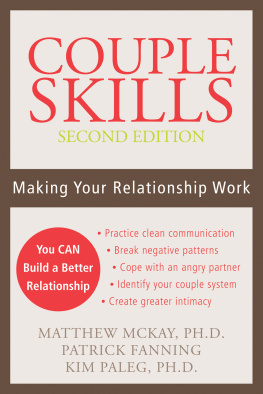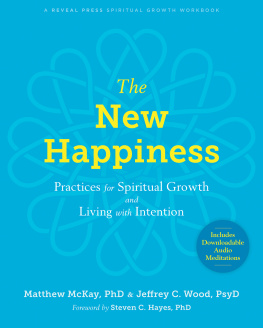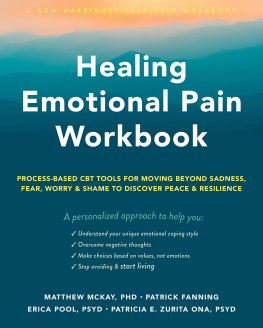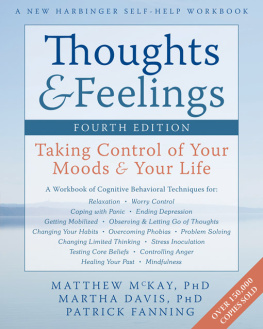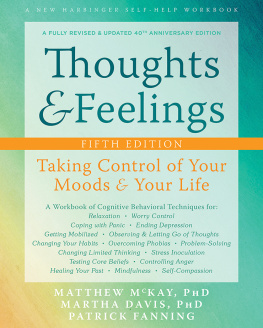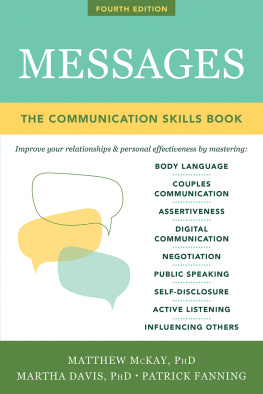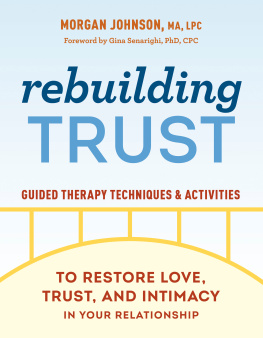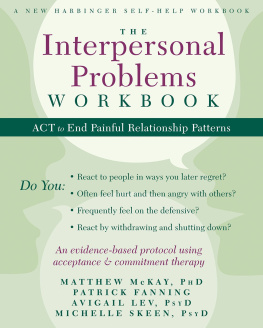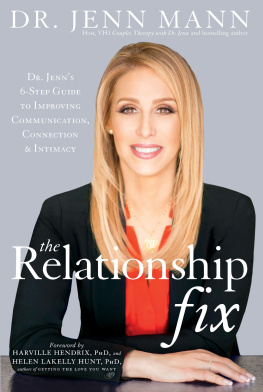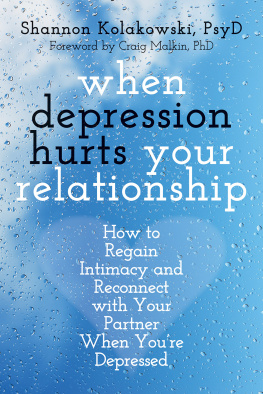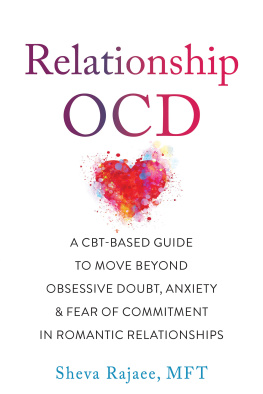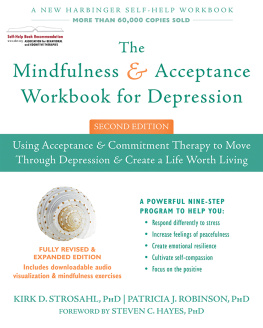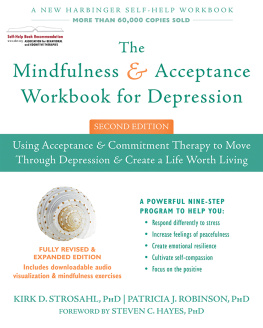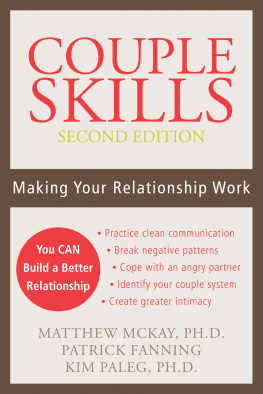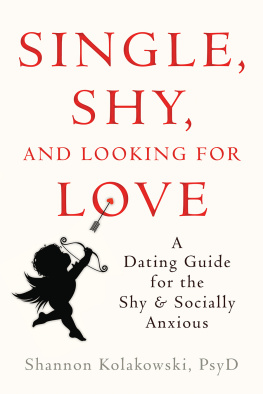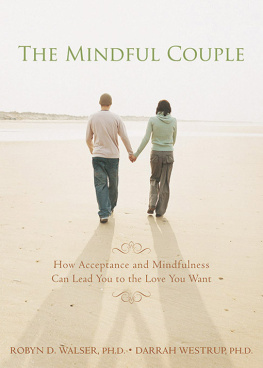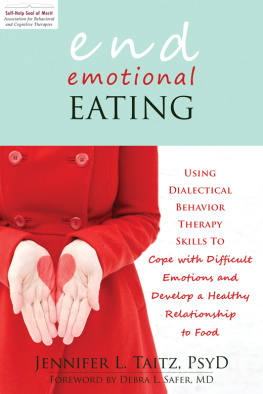COUPLE SKILLS
COUPLE SKILLS
SECOND EDITION
Matthew McKay
Patrick Fanning
Kim Paleg
Publishers Note
This publication is designed to provide accurate and authoritative information in regard to the subject matter covered. It is sold with the understanding that the publisher is not engaged in rendering psychological, financial, legal, or other professional services. If expert assistance or counseling is needed, the services of a competent professional should be sought.
Distributed in Canada by Raincoast Books
Copyright 2006 by Matthew McKay, Patrick Fanning, and Kim Paleg
New Harbinger Publications, Inc.
5674 Shattuck Avenue
Oakland, CA 94609
www.newharbinger.com
All rights reserved.
Acquired by Catharine Sutker; Cover design by Amy Shoup;
Edited by Carole Honeychurch; Text design by Tracy Carlson
Library of Congress Cataloging-in-Publication Data
McKay, Matthew.
Couple skills: making your relationship work / Matthew McKay, Patrick Fanning, and Kim Paleg. 2nd ed.
Includes bibliographical references and index.
ISBN-13 Print: 978-1-57224-481-8
ISBN-10 Print: 1-57224-481-X
1. Interpersonal relations. 2. Interpersonal communication. I. Fanning, Patrick. II. Paleg, Kim. III. Title.
Second Edition
Contents
Being in an intimate relationship can be one of the keenest human joys and one of the greatest sources of pain. Love begins with so much hope: the dream of one day feeling known, accepted to the core; the dream of belonging, of protecting and being safe; the dream of deep passion; the dream of a lasting bond. But hope collides with the realities of love: needs do not fit, anger divides, judgments erode the once easy acceptance, loneliness fills parallel but distant lives.
What makes intimacy work? Some say it is the strength of your dream, the strength of your commitment to love itself. Others say its a matter of luck, the good fortune of finding that most excellent fit. Others say you must have passion or sharing or mutual interests or common values.
After exploring hundreds of relationships, weve concluded that the people who make intimacy work have certain skills. Thats why weve called this book Couple Skills. In case after case, relationships that endure and deepen are formed by couples who know and practice basic interpersonal skills: listening, clear communication, negotiation, handling anger appropriately, and so on.
Thats good news because you can learn a new skill by reading and practicing. Its a lot harder to change your luck or your feelings of passion or your core values.
This book will help you develop and polish the skills you need to keep love alive. In creating such a book, weve had to depart from some common approaches taken in other self-help books. This book is different in three ways.
First of all, since our goal is to teach skills, the focus of the book is on action and change rather than concepts and theory. This means that you cant just passively sit and read. Youll need to get involved: do the exercises, keep logs and journals, try new behavior, risk new responses to your partner. It will take patience and tenacityand sometimes courage. But the dream and the hope you started with are worth the effort. Things will changenot by chance, not because you understand more or your relationship undergoes some surprise rekindling, but because you are more skillful at being a couple.
The second way that this book differs from others is that we dont expect anyone other than professional counselors to read the whole thing. Different couples need to concentrate on different skills. So each chapter stands alone. Each chapter contains everything youll need to learn a particular relationship skill. You can pick and choose the skills that you most want to learn and leave the rest. This means that you can get started right away, without reading a lot. From the very beginning, youll be relating differently to your partner.
To make each chapter stand alone, we have repeated some concepts or used similar exercises in two or three different chapters. And because we knew that readers would be skipping around in the book, we have provided plenty of cross-references between the chapters.
Finally, the third difference in this book is that we are not out to prove any particular theory or champion any particular school of therapy. For each skill that we wanted to teach, we picked the theory or therapeutic approach that has proven to be the most effective. For example, the chapters on schemas and distortions owe a debt to cognitive therapy. Other chapters, such as the one on reciprocal reinforcement, come out of a more behavioral approach to change. Some of the communication exercises go back to the days of Gestalt therapy groups. The chapters on your couple system are derived from family systems theory. Some of the negotiation chapter is inspired by findings in the fields of diplomacy and labor relations. The chapters on expectations and rules, old tapes, and defenses derive from psychodynamic theories.
WHO THIS BOOK IS FOR
This book is for couples, married or not; heterosexual, gay, or lesbian; young or old. We have made a conscious effort to include examples of many varieties of partnership because we believe that each is a legitimate, healthy expression of human intimacy.
This book is for new lovers who are in the early, building stages of a partnership. And its for partners of many years who want to change and improve specific aspects of their relationship.
This book is for partners who are still committed to each other, who are still willing to work toward a happier shared life. Youll also need the patience to sustain that effort over a period of time, since these techniques are no quick fix. The interventions you are about to make in your relationship each require a minimum of several weeksand more often monthsto take effect. To alter your emotional landscape, youll probably need to make more than one change. And that will take even more time.
Some of the things youll try will work, and some will be a bustnot really suited to your particular style or needs. And so you have to be willing to fail: to accept that something didnt work for you while nonetheless continuing to put effort into learning the next skill.
This book is not appropriate for couples who are dealing with a significant substance abuse problem. Since an alcohol or drug problem will negate any new skill you learn here, that problem must be addressed first.
If your partnership is currently affected by threats of violence, by battering, or any form of physical cruelty, you should seek immediate professional help. The physical safety of each partner must be assured before the book can be of value to you.
We also recommend professional help if you are currently dealing with infidelity or any other significant breach of trust in your relationship.
WORKING ALONE/WORKING TOGETHER
Many of the chapters in this book are appropriate for making unilateral changes in your relationship. They will show you, step by step, how to alter your patterns of interaction. And by the nature of the couple system, when you change, your partner has to change in response. When you take some new action, there will inevitably be a reaction. Even the smallest effort you make can have a big ripple effect.
Sometimes your partner will resist the new things you try. Most people find changeeven positive changefrightening. But if you are consistent, if you keep up the new behavior, chances are good that your partner will shift in a positive direction too.
While unilateral work can be effective, working together will almost always get faster results. You will both be focused on the same goal, and each of you will reinforce and support the other. You will each feel valued and cared for when you see the other trying.

